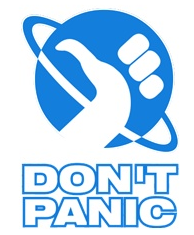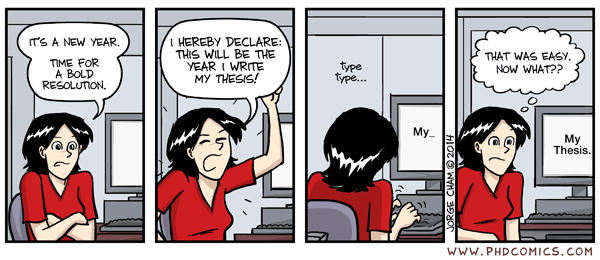Today something disturbing happened. I was about to post something witty on twitter and, as I was typing, I stopped myself. I still thought the post was funny. I didn’t see anything wrong with it. But there was a nagging feeling that if I posted it, someone, somewhere would find something terrible hidden in the layers of meaning that I just couldn’t see at the moment. Surely, this harmless seeming two-liner was offensive in some way, and I just didn’t have the brain-power or life experience to understand. If I posted this, someone might be offended. Or someone would get mad at me for being offensive – and I really don’t want to offend people. I like people. I don’t want them to get hurt because of my thoughtlessness.
A split second later another thought crept in: I’m about to enter the academic job market. I have just published a book that I don’t want to sacrifice to a 140 character indiscretion. Now is not the time for humour.
So I deleted my tweet.
And then I wondered whether I’d done the right thing. Was I sacrificing more than a silly joke? Some higher principle of free speech and moral independence? And what for? For my career or out of genuine concern for other human’s feelings and dignity?
If you are a digital denizen in the year 2016, and especially if you are an academic navigating the politicised campus, you have been flooded with op-eds, blog posts and think pieces either condemning or demanding trigger warnings, safe-spaces and other identity protecting policies. Shitstorms are everywhere. So are writers and journalists condemning the “culture of outrage”.
What I admire most about all these people writing on these issues is how sure they are of themselves and their opinions. How outraged they are either by the kinds of bigotry allowed in the public sphere or the kind of censorship undertaken in the name of liberal ideals. I myslef am uncomfortably torn apart.
A few days ago, Ellen Degeneres tweeted an image of herself riding on Usain Bolt’s back with the caption “this is how I’m running errands from now on”. I don’t watch sport. I don’t really know who Usain Bolt is (though from the picture I gather that he runs really fast). I don’t even watch Ellen’s show – I know who she is primarily because she is married to Portia DeRossi, who I worshipped growing up. Anyway – leaving my pubescent longings aside – the point is, I know about this stuff not because I am remotely interested in any of the people involved but because someone posted a reaction to the reaction to the reaction to DeGeneres post. I kid you not. This is literally what happened: DeGeneres posted a picture of herself riding on a black athlete’s back (for this to make sense the colour of his skin is relevant, so bare with me). Then there was an outrage likening the photoshopped image of DeGeneres to pictures of American slave owners “riding” on their slaves.
I don’t watch sport. I don’t really know who Usain Bolt is (though from the picture I gather that he runs really fast). I don’t even watch Ellen’s show – I know who she is primarily because she is married to Portia DeRossi, who I worshipped growing up. Anyway – leaving my pubescent longings aside – the point is, I know about this stuff not because I am remotely interested in any of the people involved but because someone posted a reaction to the reaction to the reaction to DeGeneres post. I kid you not. This is literally what happened: DeGeneres posted a picture of herself riding on a black athlete’s back (for this to make sense the colour of his skin is relevant, so bare with me). Then there was an outrage likening the photoshopped image of DeGeneres to pictures of American slave owners “riding” on their slaves.

tweet from @Br_mabe showing white people riding on slaves
Then Ellen tweeted “I am highly aware of the racism that exists in our country. It is the furthest thing from who I am”. Then there was a flurry of people outraged by the shaming of DeGeneres for a “harmless” tweet. Then there was a countermovement of people explaining why Ellen’s post was not harmless but in fact problematic given America’s history and current political situation. I am writing this down so historians from the future get a better understanding of our collective psychosis.
Please don’t take my jovial tone as an indication that I am not taking this seriously. I am. For many reasons. For one, because systematic racism against black people is alive and well in America (among many other places) and people die and are wrongfully incarcerated because of it every single day. If you think this issue is about “outrage” or “being offended” you are sorely missing the point. The point is that racism kills and sexism gets people raped and abused. What we normalise as a society – what we joke about, what we show in ads and movies – changes lives. To think that jokes don’t matter is to fundamentally misunderstand the human mind. Yes, not every man who sees an ad in which a woman is hit by her boyfriend will then feel an urge to hit his wife. Most won’t. But if hitting women is shown to be normal in most ads and TV-shows, men who commit domestic abuse (or are tempted to) will have an easier time justifying and continuing this behaviour. What we consider normal determines what behaviour we accept in ourselves and others; at the same time, what we consider normal is determined by the culture that surrounds us – jokes, ads, and all.
But there is another reason I am taking this seriously. Shitstorms happen. And knowing my personality, my sense of humour, my inability to keep my opinion to myself, to voice my thoughts as a process in need of debate, they will sooner or later happen to me. Last week I did a one hour reading / interview on the radio. Afterwards someone I hold very dear did not speak to me for three days. I hadn’t meant to offend them. But I did. I had cracked a joke I thought harmless and sweet; they had found it insulting. While I am writing this a blog post I wrote is being published (in translation) on the website of an important German newspaper. The article hasn’t been online for ten minutes and there are already two comments written by people taking offence with my attempts to include writers on my curriculum who are not white, straight and male (update: by the time this blogpost was published, there were an additional 124 comments and counting). Even what I consider the least problematic statement ever uttered by me – it is a good idea for reading lists to include many different kinds of writers and not be exclusively taken up by members of the same group, namely white, straight, European males – can spark controversy. Even my attempt to be more inclusive is divisive. How fascinating. How terrifying.
Unlike most people writing about shitstorms and the like, I have no firm opinion. I understand that public outrage can be important. I think if people say bigoted things that propagate hatred, violence and injustice, it is helpful that other people call them out on it to avoid normalisation. Shitstorms indicate that a certain behaviour will not be tolerated. If an ad in which a woman is hit is followed by a shitstom, domestic abusers are more likely to understand that such behaviour are not normal and not accepted. I get that.
At the same time, I see that action and consequences often appear disproportionate. People say stupid things all the time. People continuously and thoughtlessly say racist, sexist, antisemitic things, without even knowing it and mostly, without other people noticing. If I had a penny for every time someone thought they were paying me a compliment by saying “I would never have thought you are Jewish – you’re so pretty”, I’d be another antisemitic stereotype (a Jew with a lot of pennies). And despite the fact that everybody says dumb shit from time to time most people go through life unscathed, while some people lose their jobs and friends over thoughtless tweets. Others get no-platformed and thus disbarred from public debate. Some get shamed and attacked – often on a personal level.
I really don’t want any of these things to happen to me. But they probably will and I guess that’s ok. I guess that’s the price for speaking and writing in public. I guess that’s the price I have to pay for being part of a society in which we say when we think someone is being a dick. Free speech means people get to say what they think – sometimes what people think is that other people said awful things and need to be taken to account. The right for free speech does not include protection from criticism – and it shouldn’t.
So instead of lamenting, condemning, or criticising the current culture of public debate, maybe I should just accept it and find a way to manoeuvre it. A way to voice and listen to criticism and to apologise when I do wrong. But at the same time I can also hope that we, the public, find a way to criticise and engage with each other productively and respectfully. Instead of complaining of Ellen’s racism, maybe critics could have said “Ellen, you probably weren’t thinking of that but actually there is a long history of white people taking pictures of themselves sitting on their black slaves – given the racist subtext, maybe you’d like to take it down”. And Ellen could have said “I wasn’t aware of the history of these kinds of pictures and I had no intention to be racist. Thanks for sharing your perspectives and helping me be a more sensitive human”. At least these are my plan for any future shitstorms. Wish me luck.




 you’re wrong,” when somebody suggests something).
you’re wrong,” when somebody suggests something).





